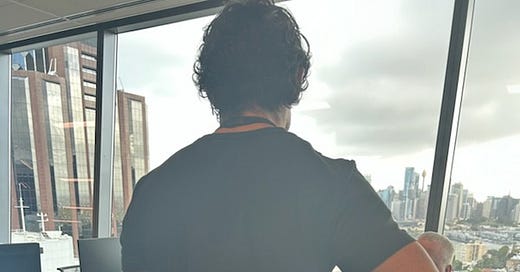I ripped my pants at work last week – a colossal 20cm tear down the backside, that gave my colleagues an unsolicited glimpse of my right butt cheek.
They teased me to no end, naturally. Then I spent the train ride home, hoping no one else would notice. Looking down, trying to avoid eye contact, with all three eyes.
The funny thing is, four days earlier I was stomping around the Sydney Mardi Gras After Party in assless chaps – by choice – and loving every second of it. My butt was out for the world to see, and it felt liberating.
It’s strange how one scenario left me embarrassed, and the other left me feeling euphoric.
So, what changed?
Sure, context matters. If you’re at a big gay disco designed for over-the-top self-expression, you’re basically required to flash your ass upon entry. But if your work pants transform into assless chaps during a team meeting? Suddenly you’re sitting with HR.
But that’s not the only thing.
Underneath the surface, what really happened is I got tangled up in the perfection myth — the belief that I should present myself flawlessly at all times, so nobody sees my imperfections.
Most of us spend insane amounts of time and money building these pristine images of ourselves: the nice clothes, fancy job titles, picking the perfect photo for Instagram.
And then something rips, literally or figuratively, and you’re forced to face the truth: You’re not perfect. You’re a living, breathing, flawed human being.
In The Velvet Rage, psychologist Alan Downs writes about how we chase a veneer of perfection to shield ourselves from shame, hoping nobody notices our flaws. But ironically, life loves to expose them — like my ass in the office.
So what should we do?
We can either focus on chasing perfection — something we can’t live up to or control — which invites a whole raft of mental health issues.
Or we can embrace our imperfections.
Mentor and leadership coach, Ben Crowe says that, “Imperfection isn’t a burden; it’s an invitation.” That invitation is to embrace vulnerability.
When we allow our imperfections to be seen by owning the situation, or sharing the story, we open the door to genuine human connection. Perfection can be isolating whereas, vulnerability is what allows other people to say, “I see you, and I’m with you.”
So maybe the real takeaway isn’t to buy new pants (besides they are currently out of stock). It’s to recognise that being human means occasionally showing your cracks and making an ass of yourself.





Hilarious Andy but as usual the insights seep through. Takes courage to be vulnerable. For some reason, we men (mostly) thought the opposite was true.
Great article! Perfectionism is often a hiding place to avoid real problems and self exploration. It is explored well in Hugh Mackay’s book “the inner self - the joy of discovering who you really are”xx